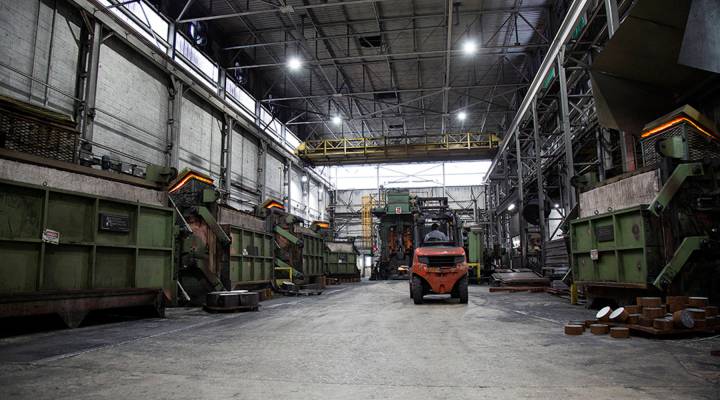
If manufacturing jobs can’t come back, what happens next?
If manufacturing jobs can’t come back, what happens next?

Editor’s Note: This interview was conducted during our a live show broadcast from Erie, Pennsylvania. Erie is at the center of our year-long reporting project, “The Big Promise.”
Erie is no stranger to losing manufacturing jobs. For years, GE transportation was the largest employer in the region until it cut 1,500 jobs in 2015. That accounted for an entire percentage point of the county’s unemployment rate.
“Jobs” is a word that helped define President-elect Donald Trump’s campaign. He went around America telling people that he would bring manufacturing jobs back to places like Erie, Pennsylvania. After voting for President Barack Obama two elections in a row, Erie County flipped for Trump in 2016.
Those who voted for Trump in Erie believe that he will try to bring these jobs back. However, a lot of jobs like that don’t exist anymore. The jobs that do exist face other obstacles like low wages and possible relocation.
So what happens now? To get some answers Marketplace Host Kai Ryssdal talked to Kenneth Louie, an associate professor of economics at Penn State Behrend and director of the Economic Institute of Erie. Below is a transcript of their conversation.

Kai Ryssdal: So test our hypothesis that Erie is a good place from which to draw larger lessons about this economy in the coming four or maybe eight years.
Kenneth Louie: I think Erie is an excellent place to draw such lessons because we are fairly representative of many similar cities across the so-called Rust Belt that have suffered tremendously from the traumatic loss of manufacturing jobs in the early 1950s. Manufacturing jobs made up more than 50 percent of total employment, about 50,000 jobs. Now it’s down to about 20,000 jobs — less than 20 percent of total employment. So like other similar cities in that situation, we’ve really been suffering. But the good news is that much of the academic literature suggests that the cause of those job losses are much more attributable to technological advancement. And so the good news is that to the extent, we want to implement policies to help those workers who are suffering.
Ryssdal: All right, so talk to me for a second about those workers — because we have had a lack of specifics from the president-elect and his team about what he is going to do other than the broad strokes of protectionism tariffs and bringing jobs back. Were you to get a phone call from Mr. Trump tomorrow night before his inaugural, what would you say? What is to be done about these jobs that the market has other plans for?
Louie: In my opinion, the best types of policies are those that provide assistance to American workers to adapt to those rapid technological changes, things like job retraining education, early childhood education get kids started early — those kinds of things that help us adapt to those technological advances are, in my opinion, much more likely to be effective as opposed to, let’s say, trade restrictive policies.
Ryssdal: Somebody suggested to one of our producers this morning that the example that Erie is shooting for is the Pittsburgh example, which of course had steel, went horribly downhill after the steel industry shut down, but now has come back largely on the backs of health care, which is a major industry in this town. Do you buy that comparison?
Louie: Yes, to a very large extent. In fact, I’ll just give you a couple of quick examples right here at Penn State Erie campus. We have a complex called Knowledge Park and we are attracting entrepreneurs and major companies that are collaborating with our faculty and students to provide those next generation of jobs.
Ryssdal: Also not for nothing. Plastics engineering, right? That’s a huge thing that goes on…
Louie: Exactly. Yes.
Ryssdal: Does the economy exist in Erie that will allow the jobs Mr. Trump is talking about to come back?
Louie: Once again, if the true culprit is technological advance then it’s unlikely that we will see a resurgence in the more traditional kinds of manufacturing jobs. But as I mentioned, companies locally like Cybersonics, which produce a sophisticated medical equipment, SKF Aerospace, which produces sophisticated parts for the aerospace industry — those kinds of manufacturing jobs which require more training are likely to lead the future.
Ryssdal: Are you economically hopeful, as a guy who studies this stuff?
Louie: Absolutely. And judging from what you heard from our earlier guests, one of the best assets we have in this area are people who are so dedicated to the region, who are enthusiastic about Erie and who are such great advocates for for our region.
Ryssdal: Spitball it for me, if we come back in a year, has anything changed?
Louie: It’s always hard to forecast the future. But I would say I am modestly optimistic because the worst seems to have been in the past year and a half when we had rather substantial layoffs at GE and other manufacturers. But that seems to have been tapering off, jobs have held steady at about 20, 300 in manufacturing for the past three months.
This story was produced as part of our election series, How the Deck is Stacked, in collaboration with Frontline and PBS NewsHour. You can find more stories related to this series here.
There’s a lot happening in the world. Through it all, Marketplace is here for you.
You rely on Marketplace to break down the world’s events and tell you how it affects you in a fact-based, approachable way. We rely on your financial support to keep making that possible.
Your donation today powers the independent journalism that you rely on. For just $5/month, you can help sustain Marketplace so we can keep reporting on the things that matter to you.


















